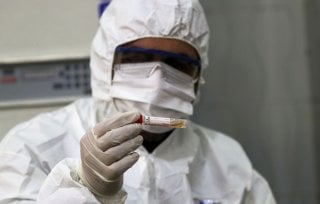Anti-ISIS Coalition Takes Aim At New Enemy: Coronavirus
U.S.-led forces in Iraq and Syria now have to grapple with a different kind of threat.
New personnel joining the U.S.-led counter-ISIS task force will be quarantined for 14 days before joining daily operations, Combined Joint Task Force Operation Inherent Resolve announced on Sunday.
U.S.-led forces operating in Iraq and Syria now have to grapple with a new threat: a pandemic that has overwhelmed healthcare systems even in wealthy, peaceful countries. The autonomous entity in Northeast Syria, which is especially at risk, reported its first coronavirus-related death on Friday. The coalition has provided equipment to help Syrians fight off the contagion—but it also has to grapple with the possibility of infections within its own ranks.
“Ensuring the protection and well-being of all members of the Coalition and those members of our security partners that we operate alongside daily is paramount to the success of the mission,” said Col. William Porter, command surgeon for Operation Inherent Resolve, in a Sunday statement.
The statement added that all of the task force’s bases have “established and rehearsed procedures” and quarantine spaces set aside for the event that the virus arrives. The Coalition had announced two days before that it was using teleconferencing and drone-mounted cameras to conduct meetings and training without physical contact.
The lack of quarantine facilities had caused chaos aboard the USS Theodore Roosevelt, a U.S. aircraft carrier in the Pacific Ocean that has been forced to dock in Guam for nearly three weeks after an outbreak of the novel coronavirus.
U.S. forces in Syria are not confined to the same small spaces as an aircraft carrier crew, but they are operating in a potentially virus-laden environment.
The U.S.-backed autonomous entity in Northeast Syria has been forced to rely on the Russian-backed central government in Damascus for both coronavirus testing and international aid.
The region reported on Friday that a 53-year old man with the coronavirus disease had died on April 2. Kurdish-led authorities accused the central government of withholding information about the death for over two weeks, raising the spectre of an undetected outbreak.
The coalition is circumventing the Syrian central government to deliver emergency aid directly to the northeast. U.S. forces delivered $1.2 million in equipment to the Syrian Democratic Forces (SDF) and two Syrian hospitals on April 3.
Coalition spokesman Col. Myles B. Caggins III said that the aid was coming out of the Counter-ISIS Train and Equip Fund, as the SDF is guarding two dozen prisons and detention centers for former ISIS members. The equipment includes surgical kits, defibrillators and oximeters, as well as protective gear for prison guards.
The SDF quelled a prison riot in Hasakeh on March 30, as captured ISIS members smashed security cameras and internal walls in a mass escape attempt.
Other members of the Coalition have donated to neighboring Iraq, where authorities have come under fire for their own response to the pandemic.
Belgium, Netherlands and Sweden have pledged $5 million to a United Nations program to shore up the Iraqi healthcare system, the United Nations Development Fund announced on April 8.
Iraq has reported 1,574 cases of the novel coronavirus disease (COVID-19) and 82 deaths, while Syria has reported 39 cases and 3 deaths in total.
Matthew Petti is a national security reporter at the National Interest. Follow him on Twitter: @matthew_petti.

